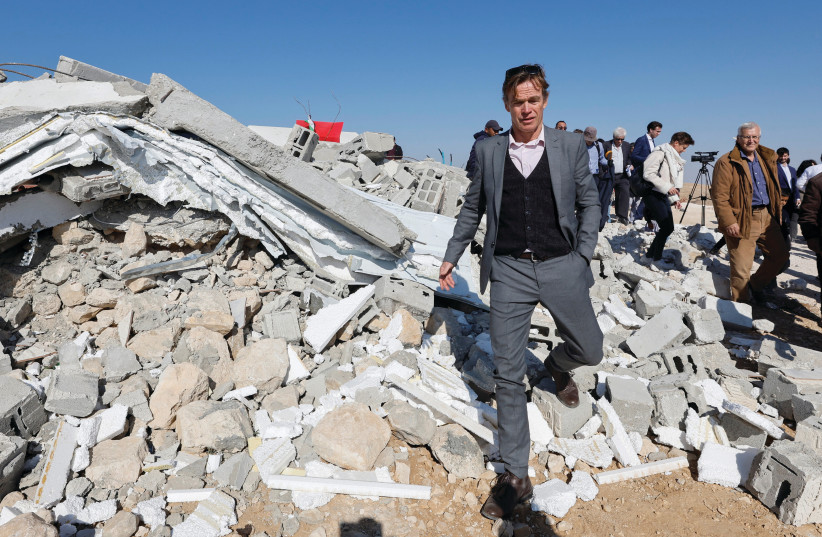After four years, Sven Kuhn von Burgsdorff’s term as head of the European Union Delegation to the West Bank and Gaza is ending. His tenure was marked by the EU’s often apologetic approach to NGO incitement and extremism, and its embrace of Palestinian organizations that support violence or promote hate speech.
To be sure, the EU has an extensive arsenal of anti-hate speech policies, which has been augmented in recent years. In May 2023, the European Parliament adopted a budgetary resolution calling on the European Commission to create a “public blacklist of NGOs, excluded from access to EU funds and institutions” if they “engaged in activities such as hate speech, incitement to terrorism, religious extremism or misused EU funds.”
Earlier, in 2019, the European Commission introduced an additional anti-terror regulation in its contract with NGOs.
In the context of anti-Jewish hate, in January 2021, the EC published a Handbook for the practical use of the IHRA Working Definition of Antisemitism, urging institutions to “ensure that funding does not go to entities and projects that promote antisemitism or other forms of hate.”
However, a review of von Burgsdorff’s record reveals the extent to which he flaunted the EU’s numerous guidelines on marginalizing extremists.

In 2019, in the face of intense opposition from Palestinian NGOs to more stringent anti-terror regulations, von Burgsdorff assured the Palestinian Non-Governmental Organizations Network (PNGO) – an umbrella organization of over 135 Palestinian organizations – that Palestinians “affiliated to, sympathizing with, or supporting” EU-designated terrorist organizations, are “not excluded from benefiting from EU-funded activities, unless his or her exact name and surname,” appears on the EU’s list of terrorist operatives.
While this act elicited an Israeli demarche, it is unclear what steps, if any, Brussels took to ensure its anti-terror policies were being effectively implemented in the region.
In February 2022, von Burgsdorff participated in an EU-funded conference convened by PNGO that included a workshop “focused on the strategies and mechanisms needed to combat counter-terrorism policies, regulations, and policies (sic).”
These incidents do not represent an isolated phenomenon but reveal a broader EU tendency to ignore its own policies when it comes to Palestinian NGOs. A review of recent EU funding underscores how anti-Israel hate speech is seemingly exempted from EU guidelines.
In 2023, the EU is providing €330,000 to 7amleh – a Haifa-based NGO claiming to advance Palestinian “digital rights.” Behind this facade, 7amleh and its partners have trained Palestinian organizations in what they refer to as “risk and reputation management and countering smear campaigns.”
Notably, in 2021, 7amleh criticized Israel for incitement, referring to speech that it insisted “expresses support for terrorist acts,” writing that “The broad definition of incitement has historically intimidated many Palestinian users into silence.”
7amleh also partners with NGOs linked to the EU-designated terrorist organization the Popular Front for the Liberation of Palestine (PFLP). This includes Addameer (prisoner support and human rights association) and Al-Haq (human rights NGO based in Ramallah), which jointly co-founded the Palestinian Digital Rights Coalition, and other NGOs.
Board members and officials of all these groups have repeatedly justified violence against Israeli civilians and praised Palestinian terrorists.
One striking example is Ahmad Qadi, 7amleh’s monitoring and documentation officer, who in a January 4, 2015, Facebook post, shared pictures from a November 2014, assault on a Jerusalem synagogue in which five Israelis were murdered.
7amleh staff celebrating the deaths of Jews
Qadi wrote, “I have been wishing for pictures like these for a while…#deeply_exciting,” and labeled the killers “heroes.”
In addition to the €520,000 provided by the EU to 7amleh since 2022, it has, since 2018, provided approximately €1.1 million to projects involving either Al-Haq or PCHR.
In May 2023, as Palestinian terrorist organizations launched over 1,200 rockets towards Israel – each one a war crime – another PFLP-affiliated organization, the Palestinian Centre for Human Rights (PCHR) published a statement in which it encouraged “the Palestinian people to resist the occupation by all available means, including armed struggle.”
This text was amended under pressure from the EU and other donors.
In an interview two days after seven Israeli civilians were murdered by a Palestinian gunman outside a Jerusalem synagogue in January 2023, Mkhaimar Abusada, deputy chair of PCHR’s board, said that Palestinians are not prevented “from taking revenge against the massacres that are occurring in Palestine.” He added, “The flame of Palestinian resistance shall not end, but continue as long as there is occupation, settlement. and Judaization.”
Al-Haq members have used similar rhetoric. For instance, on June 21, 2023, the NGO’s legal researcher and advocacy officer, Aseel Al-Bajeh, shared pictures of Palestinians killed by Israel – including Hamas terrorists who murdered four Israeli civilians in a June 20th shooting – writing “Shedding Palestinian blood and destructing [sic] entire families and futures is Zionism!”
These examples clearly demonstrate how prevalent hate speech and glorification of terror is within the Palestinian NGO community that continues to enjoy extensive EU support.
If the EU is serious about playing a constructive role in the Israeli-Palestinian conflict, it must ensure that its goal of “supporting civil society” isn’t abused to shield Palestinian NGOs. The EU and its diplomatic representatives must implement its anti-terror and anti-hate speech policies without exception.
Olga Deutsch is the vice president of NGO Monitor. Yona Schiffmiller is the director of research at NGO Monitor.
